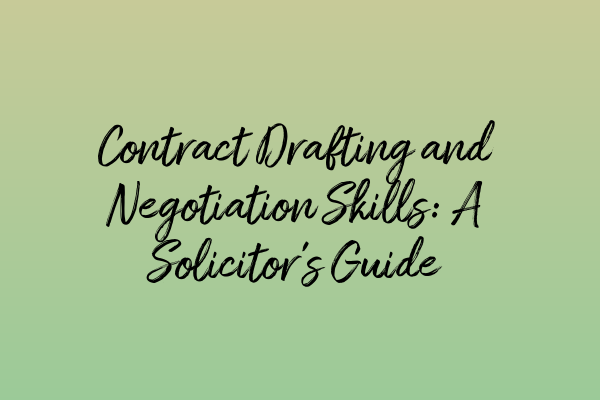Contract Drafting and Negotiation Skills: A Solicitor’s Guide
As a solicitor, one of the most important skills you can possess is the ability to draft and negotiate contracts. Contracts are the foundation of any business transaction, and having strong drafting and negotiation skills can make a significant difference in the outcome of a deal. In this guide, we will delve into the essential elements of contract drafting, provide tips for effective negotiation, and highlight the key considerations to keep in mind. So, let’s dive in!
Understanding the Basics of Contract Drafting
When it comes to contract drafting, attention to detail is paramount. A well-drafted contract should clearly define the rights, obligations, and responsibilities of all parties involved. Here are some key steps to keep in mind:
- Identify the Parties: Clearly identify the parties involved in the contract, including their legal names and addresses. This will help ensure that all parties are bound by the terms of the agreement.
- Define the Objective and Scope: Clearly articulate the objective of the contract and define its scope. This will help avoid any ambiguity or misunderstanding later on.
- Include Essential Terms: Include the essential terms of the contract, such as the payment terms, delivery timelines, and any other specific obligations or conditions that need to be met.
- Anticipate Potential Issues: Anticipate potential issues that may arise during the course of the contract and include provisions to address them. This can include dispute resolution mechanisms, termination clauses, and indemnity provisions.
- Review and Revise: Before finalizing the contract, thoroughly review the draft and revise as necessary. It’s crucial to ensure that the language used is clear, concise, and free from any ambiguity.
By following these steps, you can create a well-drafted contract that provides clarity and protects the interests of all parties involved.
Effective Negotiation Techniques
Once the contract has been drafted, the next step is negotiation. Negotiation is the art of reaching a mutually agreeable outcome by discussing and bargaining with the other party. Here are some techniques to help navigate the negotiation process:
- Do Your Research: Before entering into negotiations, thoroughly research the other party and the subject matter of the contract. This will help you understand their position and identify areas for compromise.
- Set Clear Objectives: Clearly define your objectives and determine your bottom line. This will help you stay focused and maintain a strong negotiating position.
- Active Listening: Active listening is key to effective negotiation. Pay close attention to what the other party is saying, ask clarifying questions, and demonstrate empathy.
- Offer and Counteroffer: Begin the negotiation process by making an initial offer, but be prepared to make concessions and counteroffers. Finding common ground is often the key to a successful negotiation.
- Be Flexible: While it’s important to stay firm on your key objectives, be open to compromise and creative solutions. Flexibility can help bridge gaps and lead to a win-win outcome.
By employing these negotiation techniques, you can work towards a mutually beneficial agreement that satisfies the interests of all parties involved.
Key Considerations in Contract Drafting and Negotiation
When undertaking contract drafting and negotiation, it’s essential to keep certain factors in mind to achieve the best possible outcome. Here are a few considerations to consider:
- Legality and Enforceability: Ensure that the contract complies with all relevant laws and regulations. A well-drafted contract should be legally binding and enforceable.
- Avoid Ambiguity: Use clear and precise language to avoid any potential ambiguity or misunderstandings. Ambiguity in contracts can lead to disputes in the future.
- Seek Professional Advice: If you encounter complex legal issues during the contract drafting and negotiation process, it’s wise to seek professional advice from experienced solicitors. They can provide valuable insights and help protect your interests.
- Keep Up with Legal Developments: Laws and regulations are constantly evolving. Stay up to date with the latest legal developments to ensure that your contracts remain current and in compliance with the law.
Remember, contract drafting and negotiation are skills that can be developed and enhanced with practice. By continuously honing your skills and staying up to date with best practices, you can become a highly effective solicitor in contract matters.
For more insightful articles and resources related to the legal profession, check out the following:
- SQE Prep Made Easy: Strategies and Resources
- SQE Prep: Tips and Tricks to Excel in Criminal Law
- Terrorism and Criminal Law: Balancing National Security with Justice
- Summary vs. Indictable Offences: Understanding the Differences
- Cross-Examination Techniques: Mastering the Art of Questioning
We hope this guide has provided you with valuable insights into the world of contract drafting and negotiation. Remember to approach each contract with care, attention to detail, and a commitment to protecting the interests of your clients. Happy drafting and negotiating!


Leave a Reply